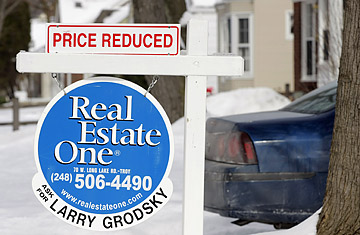
Home prices were down nearly 20% at the end of last year, according to two new reports. But there is plenty of further room to fall, say economists who forecast where the housing market is headed. The median sales price of existing homes fell to $175,400 in December, down 15.3% from a year earlier, according to the National Association of Realtors (NAR). And the S&P/Case-Shiller index shows that home prices in 20 cities fell 18.2% in November compared with the year before. Both measures make houses about as expensive as they were in 2004.
And we're probably not done yet. "Our outlook is that home prices will continue to fall, bottoming by the end of this year, but it won't be until the end of 2010, maybe even 2011, that we'll see steady price gains," says Celia Chen, an economist at Moody's Economy.com. Chen and her colleagues predict that home prices, as measured by Case-Shiller, are due to drop some 30% from their early-2006 peak. We're only about two-thirds of the way there. (See pictures of Americans in their homes.)
That forecast, gloomy as it is, still assumes the government is able to create economic-stimulus and foreclosure-prevention programs that work. If not, then home prices could be expected to fall even further. Major layoffs — there are more each day — keep downward pressure on home prices, since people without jobs are less likely to buy a house, or even to make the payments on the one they have. Foreclosures exacerbate the problem, as banks tend to sell repossessed properties on the cheap. December saw a surge in existing-home sales, especially out West, but 45% of those were distressed sales at discounted prices, according to NAR. (See which country has the best stimulus plan.)
Beyond the state of the economy, the problem is that in many markets, houses still cost too much. Housing consultancy Zelman & Associates compared what houses cost with how much people earn and found plenty of markets — including Seattle; Miami; Norfolk, Va.; Philadelphia; Los Angeles; and Salt Lake City — where homes would have to shed at least 30% more in value to get back to being as affordable as they have been historically.
Not all economists agree that housing is so overvalued, and some markets in the Zelman analysis come up as underpriced (Indianapolis and Dallas, among them). But in a way, that doesn't matter. "In a lot of places, I think, housing is fairly valued, but we overshot on the way up, and it's very likely we'll undershoot quite a bit on the way down," says Patrick Newport, an economist at the analytics shop IHS Global Insight. His firm's forecast is for another 10% to 15% drop in NAR's median sales price before things start turning around next year — and that's assuming the economy begins growing again in the second half of 2009.
We may have sobered up, but there's still the hangover to work through.
